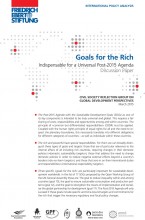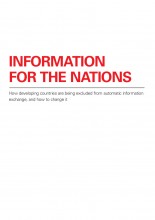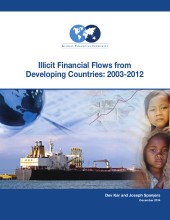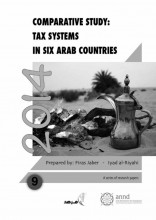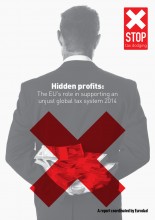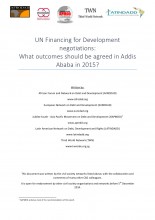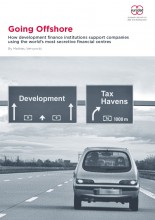Malawi, the poorest country in the world, has lost out on US$43 million in revenue over the last six years, from a single company – the Australian mining company Paladin. The money has been lost through a combination of harmful tax incentives from the Malawian government and tax planning using treaty shopping by Paladin. What has happened is not illegal – on the contrary, the combination of tax breaks and tax planning that has resulted in this loss of crucial [...]
Development Finance & Tax Justice - Archive
How one Australian mining company's tax dealings are costing the world's poorest country millions
During the 3rd official drafting session to formulate an outcome document for the 3rd International Conference on Financing for Development, a coalition of 30 NGOs from around the globe are urging governments to pave the way for setting up an intergovernmental body on tax cooperation with universal membership under the roof of the United Nations. To 'sweeten the deal' for delegates, and to strengthen their resolve, negotiators received a little gift of chocolate, which came right in time just after [...]
The current tax system is broken and needs reformation
The recently published declaration by ICRICT (Independent Commission for the Reform of International Corporate Taxation) argues that the current tax system has become obsolete as a result of globalization and the changing world economy. ICRICT states that an adjustment of the tax system is indispensable and that the efforts by OECD are not sufficient. The commission therefore aims to push governments around the world to take action. The declaration presents a set of principles and recommendations for reform. One key [...]
At their forthcoming summit in Germany, G7 leaders will meet some of their African counterparts to discuss how they can support economic growth and sustainable development in Africa. According to a recent report published by Oxfam International, the continent has enjoyed a recent economic boom but the rich world is reaping the rewards of this growth, as billions of dollars a year flow out of Africa. This is depriving it of vital revenue that could enable it to fund healthcare [...]
Every year, millions of euro worth of minerals flow into the EU from some of the poorest places on earth. No questions are asked about how they are extracted, or how it impacts on local communities. The EU has no legislation in place to ensure companies source their minerals responsibly. The trade in resources – such as gold, diamonds, tantalum, tin, copper and coal – continues to perpetuate a cycle of conflict and human rights abuses in many fragile areas [...]
Indispensible for a Universal Post-2015 Agenda
New Discussion paper for the Civil Society Reflection Group on Global Development Perspectives I March 2015
The Post-2015 Agenda with the Sustainable Development Goals (SDGs) as one of its key components is intended to be truly universal and global. This requires a fair sharing of costs, responsibilities and opportunities among and within countries. The principle of »common but differentiated responsibilities« (CBDR) must be applied. Coupled with the human rights principle of equal rights for all and the need to respect [...]
Several European NGOs are urging Jean-Claude Juncker, President oft he European Commission, to step up the ambition level for a comprehensive tax reform package for the EU. Several scandals have recently shaken the continent and shown that EU members are damaging themselves and one another with unfair and divisive tax policies. Furthermore, EU policies and positions are making it difficult for countries in the Global South to raise urgently needed resources to fund the realization of human rights. To this [...]
Old Tensions and New Challenges Emerge in Negotiating Session
On January 28-30, 2015, members of Development Alternatives with Women for a New Era (DAWN) attended the First Drafting Session for the outcome document of the third International Conference on Financing forDevelopment (FfD3) at the United Nations Headquarters. As a result, a policy paper by Nicole Bidegain reviews the main elements of the FfD process in order to set current debates in context, identify conflict areas between the different blocks of countries, and introduce some of the recommendations DAWN has [...]
Tax structure allowed McDonald’s to divert revenue for years, costing European countries over €1 billion in lost taxes between 2009 and 2013.
A new report "Unhappy Meal: €1 Billion in Tax Avoidance on the Menu at McDonald's" by EFFAT, EPSU, SEIU and War on Want outlines in detail what the authors call tax avoidance strategies adopted by McDonald’s and their tax impact both throughout Europe and in major markets like France, Italy, Spain and the U.K. The practice, the coalition says, essentially consisted of moving the European headquarters from the UK to Switzerland as well as using intra-group royalty payments and channeling [...]
Despite snowstorm warnings and ice-cold temperatures in New York, the Financing for Development (FfD) negotiations managed to pick up speed when governments convened for the first drafting session at the end of January. They are currently negotiating the outcome of the upcoming Addis Ababa Conference on Financing for Development, which will take place on July 13-16 this year, and is planned as a key milestone ahead of the Post-2015 Summit and the UNFCCC Climate Conference later this year. Tove Maria [...]
How developing countries are being excluded from automatic information exchange, and how to change it
"In 2014, we saw yet another repeat of the claim that ‘banking secrecy is over’, as some countries began to commit to a new agreement to share information on money held offshore. But the picture is not consistent: with only 52 countries currently signed up to implementation, and very few of them developing countries, it seems that banking secrecy may be over for some, but not for others. In 2013 we identified the challenges involved in creating a system of [...]
States echo civil society calls to address serious deterioration in economic and social rights
The Center for Economic and Social Rights (CESR) reports about Spain’s failure to protect economic and social rights in times of economic crisis, which has come under stern criticism from other states at the country’s recent Universal Periodic Review (UPR) by the UN Human Rights Council. One after another, Spain’s peers in the community of nations voiced their concern over the erosion of economic and social rights after four years of ill-conceived austerity measures. The gravity of the deprivations evidenced [...]
A very broad international group of Civil Society Organizations has published a critical response to a paper outlining elements of a Financing for Development (FfD) Agenda by the co-chairs of the preparatory process of the upcoming 3rd FfD Conference in Addis Ababa in July 2015. Overall, the CSOs say, the document provides a good starting point for the first drafting sessions and includes most (but not all) of the policy proposals necessary to ensure a successful outcome of the Addis [...]
You are cordially invited to a side-event by the Permanent Mission of Brazil to the UN, CIDSE and Social Watch on Thursday, January 29, 2015 in the UN Conference Building, New York. Dealing with responsibilities in a financing sustainable development context, this event seeks to generate discussion on conceptual challenges such as an evenhanded approach to the three pillars of sustainable development, adapting a framework like the Financing for Development process to the universal agenda of the Sustainable Development Goals [...]
Economic valuation of nature
The economic valuation of nature has now been debated for several years, having already been implicit in the Kyoto Protocol that set targets for greenhouse gas emissions and provided the framework for trading CO2 equivalents. The role of nature in models to measure prosperity and of market-based instruments in nature conservation was discussed at a conference organised by the Heinrich Böll Foundation, Global Policy Forum and terre des hommes in Bonn, Germany, in November. Presentations and discussions at the conference [...]
Washington based think tank Global Financial Integrity has launched its latest edition of “Illicit Financial Flows from the Developing World: 2003-2012.” The study finds that developing and emerging economies lost US$6.6 trillion in illicit financial flows from 2003 through 2012, with illicit outflows increasing at an staggering average rate of 9.4 percent per year—roughly twice as fast as global GDP. This study is GFI’s 2014 annual global update on illicit financial flows from developing economies, and it is the fifth [...]
A group of civil society activists, coming together in Lima for a conference of the Financial Transparency Coalition and Latindadd on “Hidden Money, Hidden Resources: Financing Development with Transparency” from 14 – 15 October 2014, has prepared a statement on the links of illicit capital flows, tax policies and gender justice. The statement argues that "tax regimes are not gender neutral. Women and men experience the impact of tax policies as part of the workforce, as consumers, producers and as [...]
The Arab NGO Network for Development, in collaboration with Christian Aid and Social and Economics Policy Monitor Palestine, explore in their comparative study on “Tax Systems in Six Arab Countries” how the tax systems of Arab countries have contributed to the lack of opportunity, growing inequalities, marginalization and exclusion suffered by the majority of people living in the Arab region. The revolutions witnessed by some countries in the region and the instability and crises in others are in part a [...]
The EU's role in supporting an unjust global tax system 2014
Eurodad, together with partners from all over Europe (including GPF) has released a new report “Hidden Profits”. Coming right in time to complement the Luxembourg Leaks investigations, the report compares 15 EU countries’ performance on combating tax dodging and ensuring financial transparency and finds they are still failing to address urgent problems, which cost both developed and developing countries billions of euros in lost tax revenue every year. Each country is also directly compared with its fellow EU member states [...]
What outcomes should be agreed in Addis Ababa in 2015?
2015 will be a landmark year for the global fight against poverty and for equitable and sustainable development, with three crucial summits in just six months. A central issue for all three summits is concrete proposals for reforms to international financial and trade systems so that they support the achievement of global sustainable development goals. Such reforms should be based on the right to development for all countries and ensuring economic and social rights for all. There are sufficient funds [...]
On September 19 2014, Global Policy Forum, in collaboration with MISEREOR, hosted an expert panel discussion that raised many strategic questions on the topic of financing the post-2015 sustainable development agenda and the sustainable development goals. Many of the answers to these questions depend on the outcomes of negotiations in the run up to the UN Financing for Development Conference in July and the expected UN Summit to pass a post-2015 agenda in September 2015. In the meantime, however, the [...]
Secret Tax Deals of Multinationals Exposed
Based on a review of 28,000 pages of leaked documents the International Consortium of Investigative Journalists and a team of more than 80 journalists from 26 countries say, international companies such as IKEA, FedEx, Pepsi and Procter & Gamble have channeled hundreds of billions of dollars through Luxembourg and slashed billions from their global tax bills. The leaked documents come from Pricewaterhouse Coopers in Luxembourg and include hundreds of private tax rulings – so-called “comfort letters” – that Luxembourg provides [...]
How development finance institutions support companies using the world’s most secretive financial centres
Developing countries lose billions of dollars every year through tax avoidance and evasion. Tax havens play a pivotal role in this by providing low or no taxation and by promising secrecy, allowing businesses to dodge taxes and remain largely unaccountable for their actions. Development Finance Institutions (DFIs) are government-controlled institutions that, as this report shows, often support private sector projects that are routed through tax havens, using scarce public money. By supporting projects in this way, DFIs are helping to [...]
The World Bank’s Doing Business Report has been criticized by a global coalition of Civil Society Organizations to contain major methodological flaws. Such shortcomings threaten to undermine not only the report’s credibility but also the World Bank’s effectiveness in achieving its goals. Experts argue that a comprehensive overhaul of the existing indicators in the report will be necessary if it is still to serve as a useful instrument to assess the contribution of business to global development. Moreover, there is [...]
After six weeks in office, the new U.N. High Commissioner for Human Rights (UNHCHR) Zeid Ra’ad al-Hussein of Jordan launched a blistering attack on member states for insufficient funding, thereby forcing operations in his office to the breaking point “in a world that seems to be lurching from crisis to ever-more dangerous crisis," writes Thalif Deen in a recent piece for IPS. “I have been asked to use a boat and a bucket to cope with a flood,” he said [...]

